A period is the menstrual cycle’s part in which the lining of the uterus is shed. This occurs as bleeding from the womb released via the vagina. A woman often starts periods during puberty, from 10 to 16 years old. She continues until menopause when she is between 45 and 55 years old. Irregular periods can occur when a woman has a change in her contraception method, hormonal changes or endurance exercises. If irregular periods occur when a woman is in the reproductive years, it is necessary to ask for medical advice.
- 27 Tips How To Become Pregnant Naturally And Quickly In A Month/ 41 Tips How to Prevent Miscarriage Naturally In Early Pregnancy
List Of Common Causes Of Irregular Periods
In this article, Healthy Guide will show you some of the reasons for irregular periods and some natural ways that can help return your periods back to normal. However, at first, we should be aware of the definition of irregular periods as well as some common signs and symptoms of irregular cycles.
CONTENTS
I. Symptoms Of Irregular Periods
In regular period, a woman’s cycle can be predictable. A menstrual cycle often lasts around 28 days; however, depending on the individual, it can vary between 24 days and 35 days. Each year, most of the women have 11-13 menstrual periods. Bleeding often lasts about 5 days; however, it can also vary between 2 days and 7 days.
When the first menstrual period starts, it may need 2 years to build a regular cycle. Most women’s menstrual cycle is regular after puberty. The time’s length between each period is similar. Nonetheless, in some cases, the time between each period and the blood amount shed vary. And, this condition is called irregular periods.
The main symptom of irregular cycle is when the menstrual cycle is longer than 35 days, or bleeding lasts more than 7 days. If there is any change in blood flow, or there are clots that are over 2.5cm in diameter, this condition is also considered as irregular periods.
List of 36 Tips How To Delay Periods For Few Days Naturally At Home will show you some of the best natural remedies that help you delay menstrual periods for several days, so check it out!
II. Causes Of Irregular Periods
Apart from going through menopause and being pregnant, here are some other major causes of irregular periods. They include:
1. High Stress Levels
This is the first one among causes of irregular periods after marriage that we want to mention in this article. When you have a lot of stress for a long period of time, your body can start preventing ovulation. If you have recently experienced a traumatic event or lots of daily stress, the adrenals may need to work overtime, disrupting the production of estrogen as well as other reproductive hormones. Also, stress can cause hypothalamic amenorrhea. When you do not have enough estrogen, and levels of other hormones are below normal, you cannot build up the uterine lining properly; and as a result, you will have irregular periods.
Read on Top 48 Best Home Remedies For Stress Relief And Removal to discover some of the best home remedies that can give you an instant relief from stress.
2. Over-Exercising
If you do not know causes of irregular periods before marriage, over-exercising may be one among them. Although moderate exercise is important for women’s health, healthy heart, sleep, mood regulation and healthy body weight, over- exercising can also put more pressure on the thyroid, adrenal, and pituitary glands. When women rapidly exercise at high intensities, they can stop having their menstrual period suddenly.
Today, many women want to stay thin and in shape as soon as possible, and they feel that they have to exercise intensely for many days per week. This can actually increase the levels of stress, hence causing irregular cycles. “Exercise-induced amenorrhea” may be common among young women. Other issues coming along with irregular periods include eating disorders and bone density loss.
If you want to know some of the simplest home remedies for irregular periods and fertility, read on 38 Quick Natural Home Remedies For Irregular Periods And Fertility
3. Poor Diet
A poor diet that is low in antioxidants, nutrients and probiotics yet rich in stimulants can tax the thyroid and adrenal glands. For instance, consuming a large amount of sugar, artificial additives, and hydrogenated fats is associated with adrenal fatigue and thyroid issues that can increase the levels of cortisol. The high levels of cortisol can hinder the function of many other hormones, including sex hormones. Also, it can boost the breakdown of skin, bones, muscles and brain tissues.
If you are facing menstruation, it is important for you to eat enough foods. You need to consume more antioxidant-rich foods, fats and proteins. Also, you should opt for a high-calorie supplement if you have low body fat, you are underweight or are an athlete.
To know some of the best foods that both men and women should consume for better sex power, read on 51 Best Diet And Foods For Sex Power For Men And Women
4. Stopping The Use Of Birth Control Pill
This is another one among causes of irregular periods after marriage that you should know. In some cases, women can have irregular periods while on birth control; however, even when they stop the use of birth control pill, their menstrual period does not return. While a woman’s menstrual period should return within several months of stopping the birth control pill, many women have irregular periods for years after that.
Generally, a woman’s menstrual cycle includes increasing and decreasing levels of progesterone and estrogen. But, according to a study [1], using birth control pills keeps the level of estrogen high, causing the body to think that it is pregnant and then irregular periods occur. It takes many months or years for the body to correct this.
5. Thyroid Disorders
The thyroid can be the cause of the hormonal imbalances-related problems. Some studies show that thyroid disorders can cause missed periods. The thyroid gland helps control the endocrine system and the metabolism as well as affects many sex hormones. Thyroid disorders can cause signs and symptoms like changes in cortisol hormones and estrogen as well as irregular periods. The large amount of cortisol hormone can result in overall hormone resistance, which means that your body will be desensitized to these hormones.
6. Ongoing Hormonal Imbalances
Polycystic ovarian syndrome is considered as a hormone imbalance that negatively affects ovulation, making it one of the causes of irregular periods during breastfeeding that you should know. If a woman experiences polycystic ovarian syndrome, she may experience altered sex hormone levels, causing facial hair growth, blood sugar problems, acne, weight gain, and irregular cycles.
Read More: 20 Tips How To Treat Hormonal Imbalance In Females Naturally & With Food
7. Low Body Weight
When the body mass index falls below 18, you may have irregular period because of having too little body fat. Do you know that body fat is important for producing enough estrogen? So, very thin women can experience missed periods. Lack of nutrients and increased physical activity can contribute to a low body weight, bone loss and hormonal problems. However, not every woman with irregular cycles will be underweight; many women have a normal body weight, and some women are even overweight or obese.
Learn More: 23 Tips How To Maintain A Healthy Weight Without Exercise & Harsh Dieting
8. Weight Gain
Rapid weight gain over the course of several months can affect your hormone levels, making it one of the causes of irregular periods during breastfeeding. When you gain weight, your ovaries will start producing more testosterone, which can prevent ovulation. As a result, you can have longer cycles or even skip your menstrual period.
9. Cancer
Abnormal bleeding is a sign of some certain cancers such as endometrial cancer and cervical cancer. Actually, this is known as one of the common causes of irregular periods before marriage and after marriage.
10. Being A Teenager
Another one among causes of irregular periods before marriage is that you are a teenager. It can take a few years for you to have regular menstrual periods after you start getting cycles. So, if you are a teenager, you can experience irregular periods for a few years.
11. Breastfeeding
According to a research [2], the hormone fluctuations women experience when breastfeeding can result in irregular periods or a lack of period. Therefore, this is one of the causes of irregular periods during breastfeeding. Their menstrual cycles can bring back to normal after women wean their kids, but in some cases, they can experience permanent changes in their menstrual cycles post-childbirth.
12. Premature Ovarian Failure Or Early Menopause
When your ovaries age, the ovulation can start happening earlier in your menstrual cycle. After several months of your menstrual period coming earlier, you can skip a month. Generally, this condition happens in women in their 40s when their perimenopause starts; however, if it occurs in their 20s or 30s, their ovaries may be declining earlier than normal.
13. Traveling Overseas
Crossing time zones can affect your hormone levels. Menstrual irregularities can also occur if you travel to a place with a large time difference and you accidentally use 2 birth control pills in one day.
Do you want to know other common causes of irregular periods during breastfeeding and before marriage? If your answer is “yes”, keep both of your eyes on the rest of this article right now.
14. Pregnancy
When it comes to causes of irregular periods after marriage, you should not forget the reason that you are pregnant. Your irregular periods can be caused by being pregnant. It is known as one of the most common causes of irregular periods, especially as some women still have light periods early during their pregnancy.
15. Shift Work
This may sound strange when it comes to learning causes of irregular periods during breastfeeding, but it is actually one among common causes. According to a research about menstrual cycle in shift workers [3], women who often work evenings and nights had increased risk of developing menstrual problems like irregular periods. They can have very short cycles or very long ones than those who had a more set schedule. This is because shift work can disrupt the body’s circadian rhythm that is responsible for controlling many biological functions, including the menstrual period.
16. Endometriosis
Women with endometriosis may experience very heavy and painful menstrual periods. Since this condition develops several years after the first period, women with endometriosis can think their menstrual periods are normal. Occasionally, endometriosis tissue can build up or spread over time, and hence causing periods to become heavier or more painful than usual.
17. Uterine Fibroids And Polyps
The growth in the uterus can cause your menstrual period to be heavy and painful. While all of the women in the childbearing age tend to have them, they are more common in those who are African American or overweight. According to a report, about 50% of African American women develop fibroids.
18. Bladder Or Bacterial Infections
An infection will not affect your hormonal level, yet it can result in bleeding and make you think that you have irregular periods. Bacterial infections, sexually transmitted infections and pelvic inflammatory disease can cause your uterus’s inside to become inflamed. And, you will still have your regular period, yet you can bleed in between. Even, you can experience cramping and other symptoms such as tenderness or pain in the abdomen, painful urination, fever, itching or pain in the vagina, vomiting, unusual discharge.
19. Smoking
Women who smoke have worse PMS than those who do not. According to studies, smoking may affect levels of progesterone, estrogen, testosterone as well as other hormones related to the PMS’s development. Women who smoke can also experience shorter and more irregular menstrual periods than non-smokers.
20. Pelvic Inflammatory Disease
Pelvic inflammatory disease is often caused by STIs such as gonorrhea and chlamydia, which can enter the body when untreated. Other factors such as pregnancy, gynecologic procedures, or having an abortion or miscarriage can also allow bacteria to get into the reproductive organs. Then, these infections can result in scarring in the reproductive tract as well as infertility. Apart from abdominal pain, a change in vaginal discharge, diarrhea, fever and nausea, pelvic inflammatory disease can also cause irregular periods.
21. Food Allergies And Sensitivities
When it comes to learning causes of irregular periods during breastfeeding, food allergies and sensitivities may be a common reason for menstrual irregularities. Celiac disease and gluten sensitivity can both affect hormone levels, causing nutrient deficiencies and negatively affecting gut health. Besides, these conditions can also add chronic stress to the adrenal glands, and negatively affect sex hormone production.
22. Sexually Transmitted Infections
Sexually transmitted infections such as chlamydia and gonorrhea can result in unexpected bleeding between menstrual periods. Actually, these infections are common causes of irregular periods after marriage that you should not look down.
23. Alcohol
According to a study [4], drinking alcohol, even in amounts can also cause irregular periods. This is because alcohol can temporarily increase estrogen and testosterone levels, hence disrupting the normal hormonal fluctuations required for ovulation. Then, your menstrual periods can become irregular. Researchers are unsure how much alcohol can disrupt the periods because the quantity may vary from woman to woman.
24. Other Medications
This is the last but very common one among causes of irregular periods that we want to mention in this article. Taking anticoagulants such as warfarin or heparin can make your menstrual period heavier. Some antidepressants, and antipsychotics can also result in irregular periods. If a medication may affect your menstrual cycle, consult your prescribing doctor immediately.
III. How To Bring Back Your Menstrual Period
To bring back your menstrual period, you need to have balanced diet, and make lifestyle changes first. If needed, you can use natural herbs and remedies. And, here are some natural remedies that can help you bring back your menstrual cycle and simultaneously improve your sexual health:
- Use stress-reducing techniques such as light exercise, meditation, acupuncture [5] or massage therapy.
- Take adaptogen herbs, which help promote hormone balance. Some adapotgens such as maca root, holy basil and ashwagandha can help with stress reduction and immune function.
- Avoid drinking coffee and consuming other stimulants
- Have plenty of night sleep
- Avoid exposing yourself to toxic and pollutants.
- Eat many nutrient-dense foods. Some healthy fats you should add to your daily diet include nuts, seeds, coconut oil, avocados, wild-caught fish and grass-fed butter.
- Take probiotics to help the body have the healthy hormone levels. Some probiotic foods and supplements that you should try include yogurt, kefir, bone broth, kombucha as well as fermented vegetables.
- Revaluate your exercise routine and just do gentle exercise in moderation.
After reading this article, we hope that you can be aware of some of the common causes of irregular periods. And, if you are experiencing irregular cycles, you can go to the doctor and do some tests required to rule out your exact causes of your condition. If you think that this list is helpful for other women around you, feel free to share it with them right now. One more thing, if you have any idea about other common causes of irregular periods, you can share them with us by leaving your comments in the comment box below.

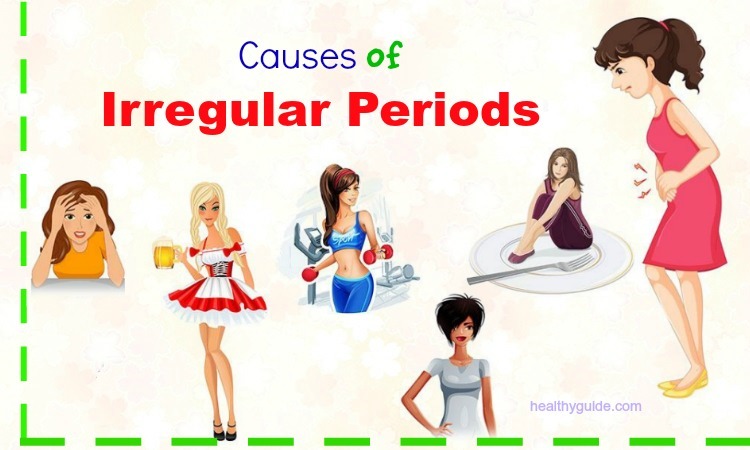
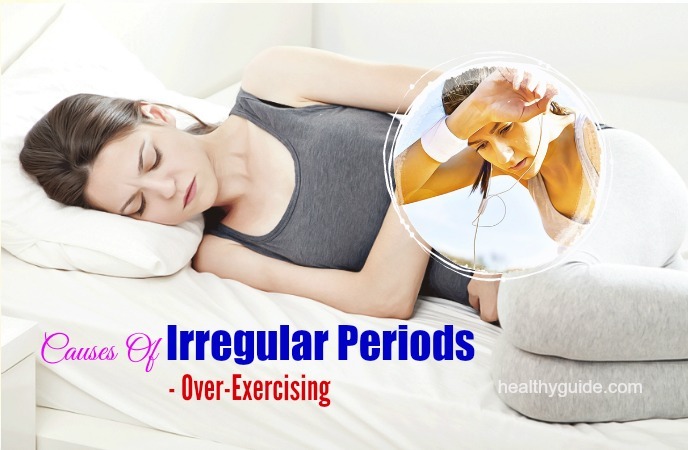
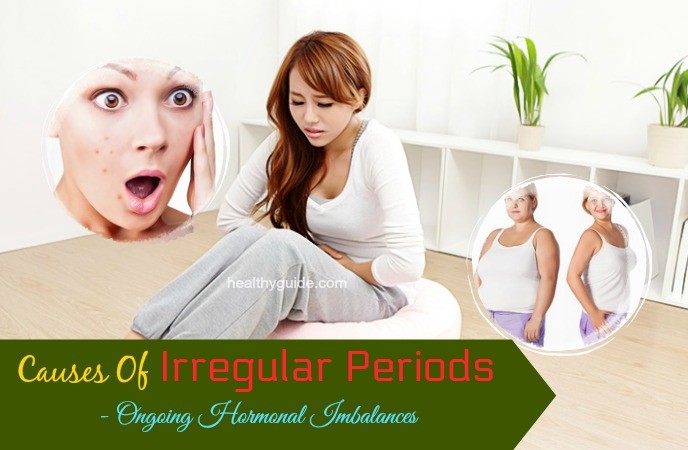
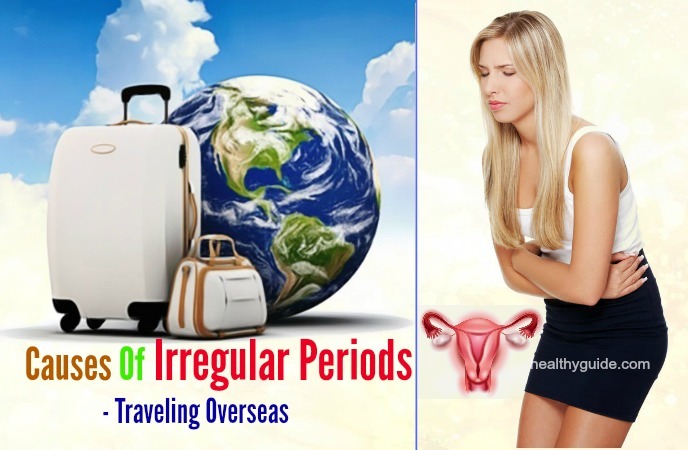
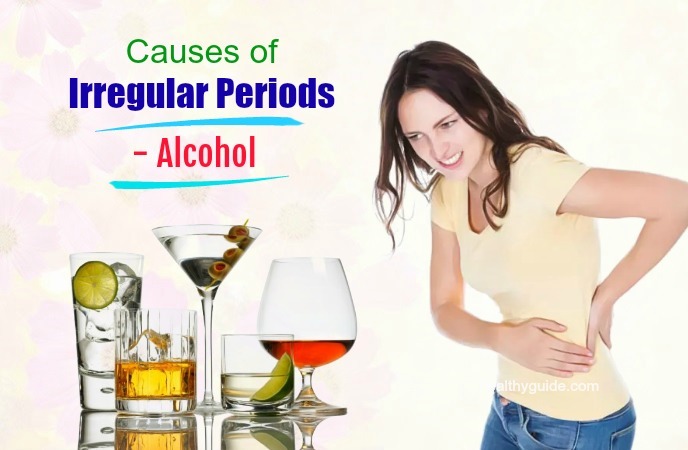



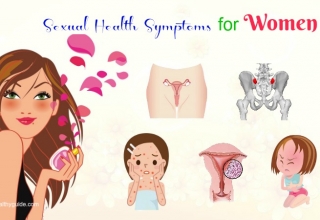


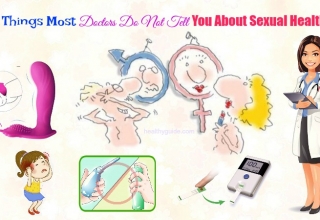

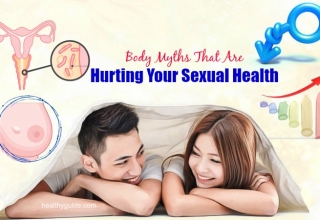





















Leave a Reply